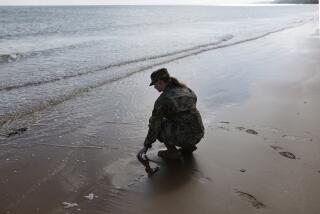War of Nerves Eases for Ships’ Crews
ABOARD THE USS NORMANDY — Chief Petty Officer Ed Fritz watched the 7 p.m. news Sunday and heard nothing encouraging. Then it was back to the dim green glow of computer screens in his darkened war room at sea.
Had President Clinton ordered a military strike on Iraq, Fritz would have assumed the task of firing the first shot from this guided-missile cruiser in the Persian Gulf. He oversees the team of Navy computer experts assigned to aim and launch Tomahawk cruise missiles.
After pacing his team through a grueling four-hour training exercise that night, Fritz watched the late news and learned of the diplomatic breakthrough that has, at least for now, averted Gulf War II.
“I actually got a good night’s sleep,” said the 33-year-old enlisted man from Virginia Beach. “Everybody here is a little relieved.”
As they absorbed the news of Iraqi President Saddam Hussein’s agreement to unrestricted U.N. weapons inspections, the Navy men and women on the front line said Tuesday that it was their threat that forced his hand. As Fritz mused of the Tomahawk: “We like to look at it as a diplomatic tool, whether we use it or not.”
But some who were mobilized for Operation Desert Thunder, the U.S. military buildup in the Gulf, voiced bitter disappointment that the threatened attack was put on hold.
Many said they are convinced that this will not be their last showdown with the Iraqi leader.
“As long as this current regime in Iraq is in place, there will not be resolution, in my mind,” said Capt. James F. Deppe, commanding officer of the Normandy, cruising 100 miles off the Iraqi coast. “That’s just a function of my personal experience coming out here time and time again to deal with exactly the same man and the same country.”
This is the Texas-born officer’s fifth trip to the region, including a role in the buildup to the 1991 Persian Gulf War, which drove Hussein’s army from Kuwait.
“We’ve spent a lot of time watching him break previous agreements,” Deppe said, “so we’ll watch patiently over the horizon if this one doesn’t work out.”
President Clinton has ordered U.S. forces to stay at “high levels of preparation” in the Gulf until Iraq demonstrates its commitment to the deal reached with U.N. Secretary-General Kofi Annan.
U.S. officials say the hardware and manpower rushed here during the past three months--including 300 combat aircraft, 30 ships and about 35,000 sailors, soldiers and aviators--will remain in place.
“I suspect we’ll be here for several more months,” said Adm. Charles Moore, commander of naval forces in the Gulf led by two aircraft carriers, the Independence and the George Washington.
For Deppe’s 350-strong crew, the deal means they will probably go home without firing a shot. The George Washington’s five-ship battle group, which includes the Normandy, is due to sail for home March 14, to be replaced by the aircraft carrier John C. Stennis and its battle group.
From the 4 1/2-acre flight deck of the George Washington to the cramped war room of the Normandy, it has been a nerve-racking three months. Sea deployment is stressful enough in normal times.
Since rushing to the Gulf on Nov. 21, the battle group’s sailors and pilots have also felt the constant ebb and flow of tensions over Iraq’s reluctance to allow U.N. inspectors unrestricted searches for chemical and biological weapons.
“This whole deployment has been spun up and spun down so many times,” said Ensign Patrick Whang, 23, of Potomac, Md. “It’s been like a roller coaster.”
When the cruiser’s 40 television monitors carried Cable News Network’s report of the agreement in Baghdad, said Greg Quilenderino, 25, a member of the ship’s fire department, cursing erupted among young firemen and engineers.
“We came over here to fight, and that’s what we wanted to do,” he said. “We wanted it so that my [2-year-old] kid doesn’t ever have to know what a gas mask is. . . . The way we were feeling about it--you couldn’t bring all this force over here and not do anything. Now we’re going to look like cowards.”
From interviews Tuesday, that does not appear to be the sentiment among the Normandy’s experienced sailors, who by all accounts have been a steadying influence on the young, often hawkish sailors.
“If you expect to do something and it doesn’t happen, you can feel let down,” said James Holt, 36, of Greensboro, N.C., who sits in the war room manning the same guns he fired in the Gulf War. “But if our presence really does force Saddam to let in the inspectors and nobody loses their lives, on our side or his, then we did our job.”
Across the room, at the Tomahawk computer terminals, Fritz led another start-the-war drill Tuesday. Even with the threat of battle ebbing, the strenuous pace of training goes on. “But it feels looser,” said computer specialist Jeff Clodfelter, 28, of Winston-Salem, N.C. “You’re more relaxed now, able to step back a little bit. You don’t have this thing pending on your shoulders.”
More to Read
Sign up for Essential California
The most important California stories and recommendations in your inbox every morning.
You may occasionally receive promotional content from the Los Angeles Times.









